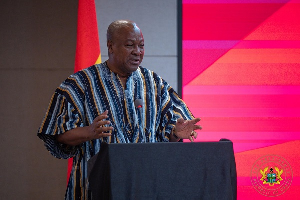The main opposition National Democratic Congress (NDC) has labelled Dr Ernest Addison, the Governor of the Bank of Ghana (BoG), as a government-backed “money printer”.
The NDC alleges that Dr Addison, in collaboration with the government's Economic Management Team led by Vice President Dr Mahamudu Bawumia, now possesses a currency printing machine that is utilised to produce money at the government's request.
During the NDC's Moment of Truth Series press conference held on Tuesday, August 8, 2023, in Accra, the Minority Leader, Dr Cassiel Ato Forson, voiced these accusations.
He criticised Dr Addison for purportedly disregarding the BoG Act and engaging in unlawful money printing, which resulted in a depletion of Ghana's international reserves in 2022.
Furthermore, Dr Ato Forson contended that this illicit printing of currency contributed to a staggering hyperinflation rate of 54 percent, leading to a severe erosion of people's income.
The Minority Leader's statement also carried a grave tone, suggesting that the consequences of such actions are borne by many Ghanaians, making a grave accusation against the Central Bank Governor.
Dr Ato Forson accused Dr Addison of violating Section 37 of Act 612 and Section 60 of the BoG Act of 2012, asserting that he had infringed upon multiple central bank regulations.
The Minority Leader went on to imply that the situation might be contributing to certain individuals, including Dr Mahamudu Bawumia and key members of the governing New Patriotic Party, amassing funds in preparation for the party's upcoming presidential primary election, suggesting the potential use of such funds to influence voting outcomes.
This pointed accusation against the Central Bank Governor is emblematic of the NDC's concerns regarding economic management and potential political influence, echoing their broader criticisms of the current government's fiscal policies.
Business News of Wednesday, 9 August 2023
Source: classfmonline.com













